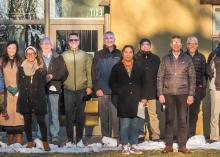Leadership from 18 Anabaptist organizations in the United States and Canada convened at the Anabaptist Collaboration on Climate Change (ACCC) on Jan. 26 and 27 to address what many consider a moral emergency.
Those gathered drafted a statement that was later signed by the majority of the participating organizations: “As organizations founded on Christian faith in the Anabaptist tradition, we recognize the significant threat to global communities, economic justice and the next generations from climate change. We are committed to explore our work and mission in support of sustainable and just climate solutions.”
The 24-hour meeting at the Mennonite Central Committee (MCC) Welcoming Place in Akron, Pa., was the largest gathering of Anabaptist leaders on climate change in North America to date. It was organized by the Center for Sustainable Climate Solutions (CSCS).
“Having so many organizations willing to come together and talk about climate change clearly reflects that this issue is important to Anabaptist communities,” said Doug Graber Neufeld, the director of CSCS.
Since its founding five years ago, CSCS has functioned as a joint initiative between three core partners: Eastern Mennonite University, Mennonite Central Committee (MCC) and Goshen College. In order to broaden its reach, CSCS is in the process of deepening its relationships with a wider range of partners in programming, governance and financial support.
The event was meant to provide a place for a focused conversation on the Anabaptist response to climate change as well as lay groundwork for future collaborations between the organizations.
Jennifer Halteman Schrock, director of Mennonite Creation Care Network that works closely with CSCS on congregational outreach, appreciated the questions posed at the gathering. “How might we leverage our unique identity in practical ways? What assets do our organizations have that we could mobilize? What could we do together? It will take time for answers to emerge, but I believe they are the right ones to ask,” she said.
“With climate change accelerating, it is clear that individual organizations will find it more and more difficult to make a difference,” said Mark Lancaster, advancement director for CSCS. “There is a growing need for building collaborations among Anabaptist organizations to create broader impact, and CSCS would like to embrace this role to coordinate work and catalyze actions.”
CSCS plans to organize more gatherings on climate change in the future, and include a broader range of participants. In the meantime, CSCS facilitators encouraged participants to consider how Anabaptist organizations working in diverse areas can incorporate climate justice into their operations and missions:
- For Mennonite Men, this looks like developing the JoinTrees campaign with the goal of planting a million trees by 2030.
- For Goshen College, climate action looks like developing young leaders and conducting research that will inform the sustainability work of others.
- For MennoMedia, it looks like incorporating Anabaptist perspectives of climate issues into the publications that reach beyond Anabaptist audiences.
The gathering left many participants with new questions, but also with newfound hope.
Mennonite Church Canada and MCC Canada were represented at the ACCC event.
To access the consensus statement and signatories, visit bit.ly/3uZlB1H.




Comments
Climate scientists commonly refer to the climate crisis as an existential threat. The leadership of North American Anabaptist organizations considers climate change 'a significant threat'.
A colossal under-statement, I should think.
Add new comment
Canadian Mennonite invites comments and encourages constructive discussion about our content. Actual full names (first and last) are required. Comments are moderated and may be edited. They will not appear online until approved and will be posted during business hours. Some comments may be reproduced in print.